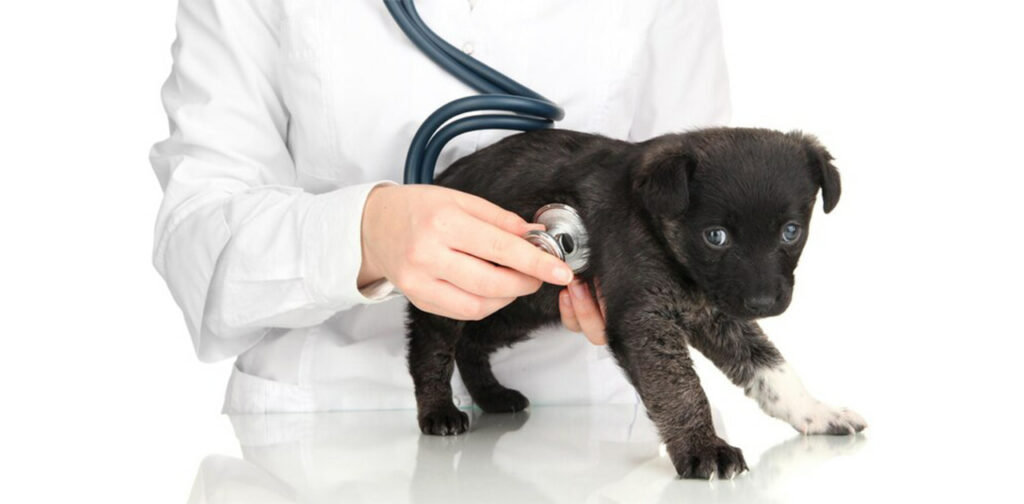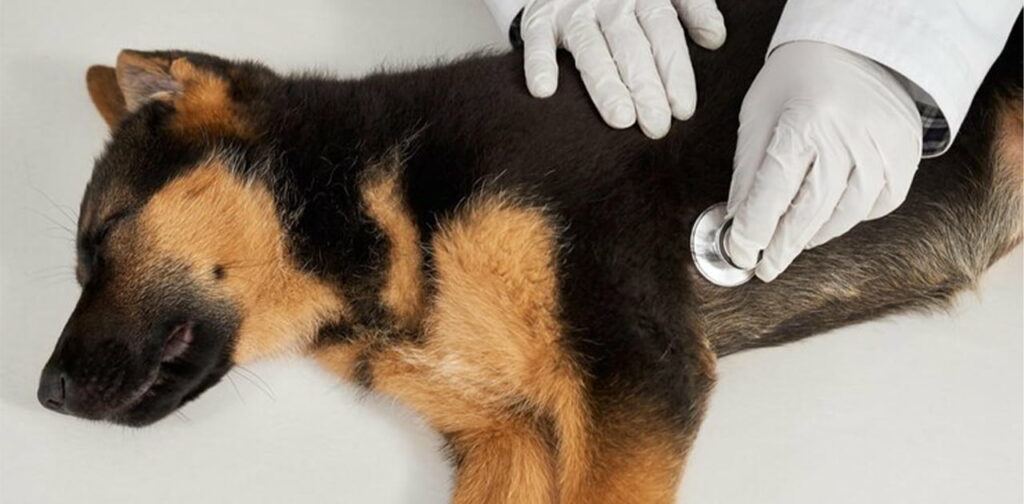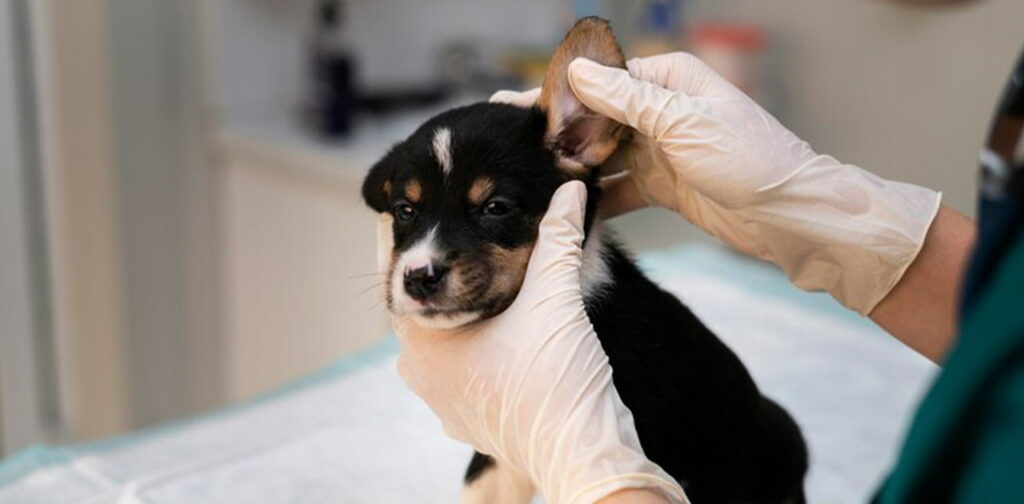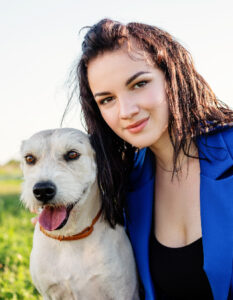Welcoming a new puppy into your life is an exhilarating experience, filled with joyful moments and the promise of companionship. Part of responsible puppy care involves vaccinations, a crucial step in protecting your furry friend from a range of potentially life-threatening diseases.
While vaccinations are essential, it’s equally important to understand the potential side effects they may have on your puppy’s health and well-being.
In this comprehensive guide, we will explore the world of “Puppy After Vaccination Side Effects” to ensure you’re well-prepared for this aspect of puppy care.

The Importance of Puppy Vaccinations
Puppy vaccinations aren’t just a routine part of pet ownership; they’re a lifeline for your beloved companion. They provide essential protection against infectious diseases that can spread rapidly within the dog community, posing severe health risks.
Vaccines aren’t just about your puppy’s well-being; they also contribute to the overall health of the dog population in your community.
Understanding Post-Vaccination Side Effects
Vaccines work by stimulating your puppy’s immune system, training it to recognize and fight specific diseases. While vaccines are generally safe, they can sometimes lead to side effects. Understanding these potential side effects is essential for responsible pet ownership.
Why It’s Essential to Be Informed
Being informed about post-vaccination side effects empowers you to make the right decisions for your puppy’s health. You’ll be better equipped to recognize normal reactions and know when it’s time to seek veterinary assistance. Let’s delve into the details of puppy vaccinations and their associated side effects.
The Basics of Puppy Vaccinations
Core Vaccines vs. Non-Core Vaccines
Vaccines aren’t a one-size-fits-all proposition. Some are classified as core vaccines, which are recommended for all puppies, regardless of their lifestyle or location. Others fall into the non-core category, administered based on your puppy’s specific risk factors and requirements.
Understanding this distinction is essential for tailoring your puppy’s vaccination plan.
Vaccination Schedule for Puppies
Puppies need a series of vaccinations to gradually build their immunity. We’ll outline a typical vaccination schedule for puppies, ensuring they receive the necessary protection at the right stages of their development.
Common Post-Vaccination Side Effects
Soreness at the Injection Site: It’s common for your puppy to experience some soreness at the injection site after a vaccination, similar to the muscle ache that humans might feel after a flu shot. We’ll guide you in recognizing and alleviating this mild side effect.
Mild Fever and Lethargy: Occasionally, mild fever and lethargy can follow vaccinations. Discover how to identify these symptoms and provide comfort to your puppy during this temporary phase.
Decreased Appetite: A temporary decrease in appetite is another common side effect of vaccinations. We’ll provide tips on encouraging your puppy to eat and stay hydrated during this period.
Sneezing and Nasal Discharge: Certain vaccinations may lead to mild respiratory symptoms such as sneezing and nasal discharge. We’ll help you understand when to be concerned and when these symptoms can be considered a normal part of the vaccination process.
Rare but Serious Side Effects
Allergic Reactions: Though rare, allergic reactions can occur after vaccinations. We’ll delve into the signs of an allergic response and how to respond swiftly to this potentially life-threatening complication.
Anaphylaxis: Anaphylaxis is an extreme and immediate allergic reaction that demands urgent attention. Learn how to distinguish anaphylaxis from other reactions and the critical steps to take in such a life-threatening situation.
What to Expect After Each Vaccination
Vaccinations are a crucial aspect of responsible puppy care, but they can sometimes lead to side effects. Understanding what to expect after each vaccination is vital for ensuring your puppy’s well-being. Let’s explore the specific side effects associated with different vaccines and how to manage them.
Distemper and Parvovirus Vaccination Side Effects
After your puppy receives core vaccinations like distemper and parvovirus, it’s essential to know what to expect. These vaccines are typically well-tolerated, but some side effects can occur. Here’s what you should watch for:
- Mild Discomfort: It’s normal for your puppy to experience mild discomfort at the injection site. Similar to the muscle ache humans might feel after a flu shot, this discomfort is usually temporary and resolves on its own.
- Lethargy: Your puppy may feel a bit lethargic after the vaccination. This is a common side effect and is generally not a cause for concern. Provide a quiet and comfortable space for your puppy to rest.
- Decreased Appetite: A temporary decrease in appetite is another common side effect. It’s essential to encourage your puppy to eat and drink during this period to ensure they stay hydrated and receive proper nutrition.
- Low-Grade Fever: Some puppies may develop a mild fever after vaccinations. Monitor your puppy’s temperature and provide extra care and attention if they exhibit signs of discomfort.
It’s crucial to differentiate between these normal side effects and potential problems. Keep a close eye on your puppy and seek veterinary advice if any unusual or severe symptoms persist.
Kennel Cough and Leptospirosis Vaccination Side Effects
Non-core vaccinations, such as those for kennel cough and leptospirosis, serve to protect against specific diseases based on your puppy’s risk factors and lifestyle. While these vaccines are essential in certain situations, they can also have side effects. Here’s what you should be aware of:
- Sneezing and Nasal Discharge: Vaccinations for kennel cough can sometimes lead to mild respiratory symptoms like sneezing and nasal discharge. These symptoms are typically temporary and should improve within a few days.
- Lethargy: As with core vaccines, some lethargy is normal after non-core vaccinations. Ensure your puppy has a comfortable place to rest and recover.
- Decreased Appetite: Non-core vaccinations can also cause a temporary decrease in appetite. Offer your puppy tasty and enticing food to encourage them to eat.
- Mild Fever: A mild fever may occur in some cases. Keep an eye on your puppy’s temperature and provide adequate care if they seem unwell.
As with core vaccines, it’s essential to differentiate between normal side effects and potential problems. Monitor your puppy closely, and if any unusual or severe symptoms persist, consult your veterinarian.

Managing Mild Side Effects at Home
If your puppy experiences soreness at the injection site, here are some practical tips for easing their discomfort and ensuring a smoother recovery:
- Gentle Massage: Gently massage the area around the injection site to alleviate soreness. Use slow, circular motions and be mindful of your puppy’s comfort.
- Warm Compress: Applying a warm, damp cloth to the injection site can help soothe soreness. Ensure it’s not too hot to avoid discomfort.
- Rest: Allow your puppy plenty of rest to recover. Avoid strenuous physical activities that might exacerbate soreness.
Encouraging Appetite and Hydration
A decreased appetite can be concerning, but there are strategies to entice your puppy to eat and stay hydrated during this period:
- Offer Tasty Food: Provide your puppy with their favourite foods to tempt their appetite. You can also warm their food slightly to enhance its aroma and make it more appealing.
- Frequent, Small Meals: Offer smaller, more frequent meals instead of large portions. This can be less intimidating for a puppy with a decreased appetite.
- Hydration: Ensure your puppy has access to fresh water at all times. If they’re reluctant to drink, you can try adding a small amount of low-sodium broth to their water to make it more enticing.
Providing Comfort during Fever
Fever can make your puppy feel miserable, but you can provide comfort and monitor their condition:
- Cool Environment: Keep your puppy in a cool, comfortable environment. Avoid exposing them to extreme temperatures.
- Hydration: Ensure they are well-hydrated. Fever can lead to dehydration, so encourage drinking.
- Consult Your Vet: If your puppy’s fever persists or if they exhibit other concerning symptoms, consult your veterinarian for guidance.
When to Seek Veterinary Assistance
While most post-vaccination side effects are mild and self-limiting, it’s crucial to be vigilant and recognize severe reactions. Knowing when to seek veterinary assistance can make all the difference in your puppy’s health and well-being.
Recognizing Severe Allergic Reactions: Severe allergic reactions, although rare, require immediate attention. Here are the red flags to watch for:
- Facial Swelling: If your puppy’s face starts to swell rapidly, particularly around the eyes, lips, or throat, it could be a sign of a severe allergic reaction.
- Difficulty Breathing: Labored breathing, wheezing, or gasping for air is a severe symptom that demands immediate action.
- Vomiting or Diarrhea: Repeated vomiting or severe diarrhea can be indicative of a severe allergic response.
- Hives or Rash: The sudden appearance of hives (raised, itchy welts on the skin) or a widespread rash is a concerning sign.
If you notice any of these symptoms, do not wait. Seek immediate veterinary assistance. Time is of the essence when dealing with severe allergies.
Dealing with Anaphylaxis: Anaphylaxis is a life-threatening emergency and requires swift action. Here are the steps to take if you believe your puppy is experiencing this severe allergic reaction:
- Call Your Veterinarian: Notify your veterinarian immediately and explain the situation. They can provide guidance and may instruct you to come to their clinic.
- Administer Epinephrine (if prescribed): If your veterinarian has prescribed an epinephrine auto-injector for your puppy due to a history of severe allergies, administer it as directed. This can help counteract the allergic reaction temporarily.
- Stay Calm: It’s crucial to remain as calm as possible. Your puppy will pick up on your emotions, and a calm demeanour can help reassure them.
- Keep Your Puppy Upright: If your puppy is having difficulty breathing, hold them in an upright position. This can ease their breathing slightly.
- Transport to the Vet: If your puppy’s condition does not improve rapidly after administering epinephrine, transport them to the veterinarian immediately. Every minute counts in an anaphylactic reaction.
Follow-up Care and Monitoring: After vaccinations, vigilant follow-up care and monitoring are essential to ensure your puppy’s continued well-being. Here’s what you should do in the days following their vaccinations:
- Observe Your Puppy: Keep a close eye on your puppy for the next 24-48 hours. Look for any unusual symptoms, particularly those mentioned earlier, such as severe lethargy, persistent vomiting or diarrhoea, or facial swelling.
- Comfort and Rest: Provide your puppy with a comfortable and quiet space to rest. Ensure they stay hydrated and offer gentle encouragement if they experience a decreased appetite.
- Contact Your Veterinarian: If you have any concerns or if your puppy’s symptoms worsen, don’t hesitate to contact your veterinarian. They can provide guidance and reassurance.

The Importance of Vaccination Records
Maintaining thorough vaccination records is not just a formality; it’s a responsibility. Here’s why vaccination records are essential:
Keeping Detailed Records: Your puppy’s vaccination records should include:
- Vaccine Type: Record the names of the vaccines administered, including core and non-core vaccines.
- Dates: Document the dates of each vaccination, including initial shots and boosters.
- Lot Numbers: Note the lot numbers of the vaccines used. This information can be crucial for tracking and safety.
- Veterinarian Information: Include your veterinarian’s contact details and clinic information.
Sharing Records with Your Vet: Effective communication with your veterinarian is crucial for your puppy’s health. Sharing your puppy’s vaccination records with your vet is an essential practice because it helps:
- Track Vaccination History: Your veterinarian can monitor your puppy’s vaccination history and recommend boosters and follow-up vaccinations as needed.
- Plan Preventive Care: Based on your puppy’s records, your vet can develop a tailored preventive care plan to address specific health concerns and risks.
- Emergency Situations: In case of emergencies or severe reactions, having a record of your puppy’s recent vaccinations can assist in diagnosing and treating the issue.
Conclusion
In the grand scheme of responsible puppy care, vaccinations are a critical component. Understanding the potential side effects and knowing how to respond empowers you as a pet parent.
With the knowledge and insights gained from this comprehensive guide, you can ensure that your beloved puppy not only receives the best protection against diseases but also experiences a smoother recovery from any vaccination-related side effects.
Remember, being a well-informed and attentive pet parent is the best way to ensure your puppy’s long and healthy life.





